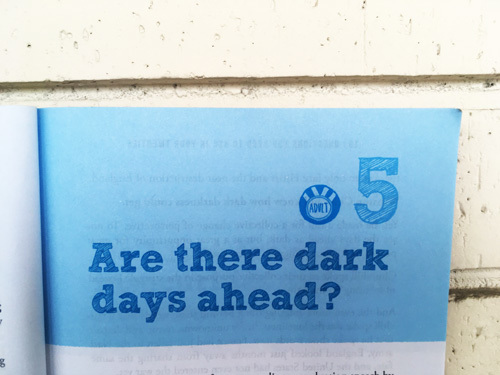Are there dark days ahead?
This question came out of a not-so-ordinary college graduation speech by a not-so-ordinary speaker.
First, the graduation speech was only four minutes long! A miracle in itself.
Second, and most importantly, the speaker that day wasn’t just addressing the graduating class at Harrow School, but a whole country. And doing it with more power and truth in four minutes than most speakers deliver in a lifetime.

The graduation speaker? Winston Churchill.
The year? 1941, as England stared down their complete annihilation in the hands of the Nazi army.
Yet, in the face of this harsh reality, Churchill spoke these words:
Do not let us speak of darker days: let us speak rather of sterner days. These are not dark days; these are great days—the greatest days our country has ever lived; and we must all thank God that we have been allowed, each of us according to our stations, to play a part in making these days memorable in the history of our race.”
Churchill knew dark days. Through his lifetime the battle with depression that he called his “black dog,” to his political defeat that sent him in near political exile for the ten years leading up to the war, to only face Hitler and the near destruction of England.
Winston Churchill knew how dark darkness could get.
Yet, he made a call for a collective change of perspective.
To not see the days ahead as dark, but as a great opportunity for great people to do great things for a great cause.
Churchill spoke to their collective purpose in the struggle instead of focusing just on the pain.
And the even more amazing thing beyond these words that Churchill spoke was the loneliness, heavy unknowns, terror, and despair that he spoke these words into.
France had just fallen to the Nazi army, England looked just months away from sharing the same fate, and the United States had not even entered the war yet.
Churchill was not speaking these words retroactively, looking back at the course of events that led them to victory.
Churchill spoke these words in the face of utter destruction, yet he foresaw a radically different outcome than what the current facts at hand were shouting.
He spoke into the face of destruction with hope and purpose. Then, he worked with all his heart to create that reality.
Let the Dark Be Light
When we think about the tough times of our twenties and thirties, and there will be many.
And the tough times we will go through in the years after our twenties and thirties, and there will be many.
When we feel like the world is getting darker around us by the minute.
Let us take to heart Churchill’s cry to a generation embroiled in the toughest, yet greatest, days imaginable:
Never give in. Never give in. Never, never, never, never—in nothing, great or small, large or petty—never give in, except to convictions of honor and good sense. Never yield to force. Never yield to the apparently overwhelming might of the enemy.”
No matter how dark the darkness feels, there is always hope.
When it’s dark, that just means it’s time for light-bearers to rise up for the world to see.
When it’s dark, that’s an opportunity to bring the light. Will you grab a torch and shine? (click here to tweet that)
This article came from my book 101 Questions You Need to Ask in Your Twenties (and let’s be honest, your thirties too). See what readers are saying about 101 Questions here.
Click here to listen to the four-minute speech from Winston Churchill at the Harrow School.



